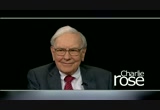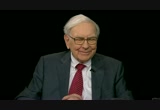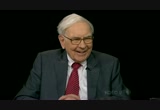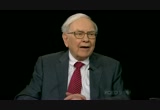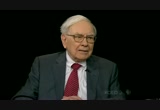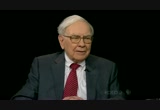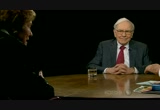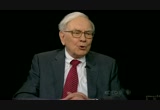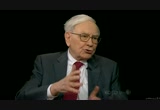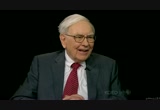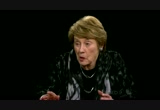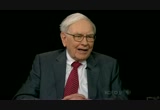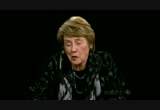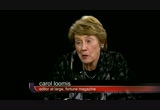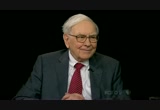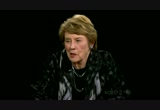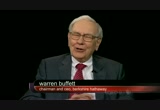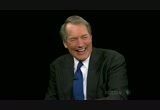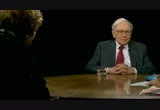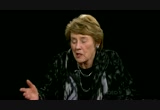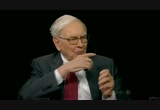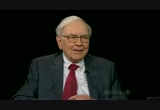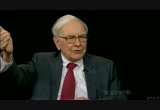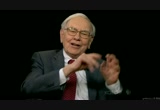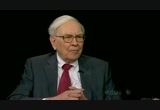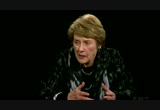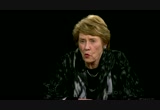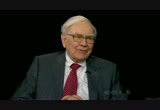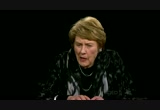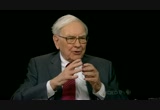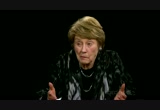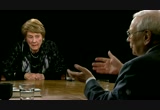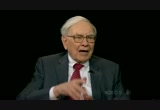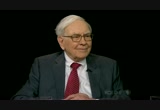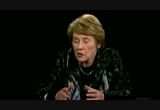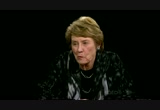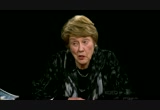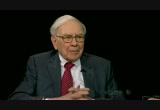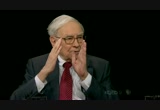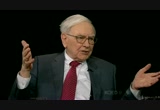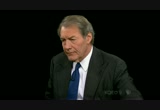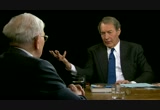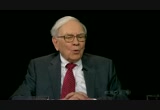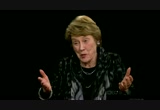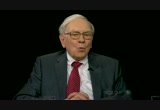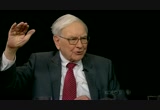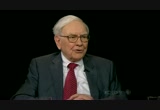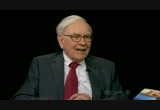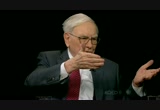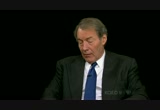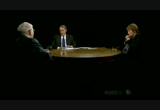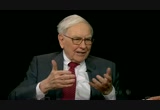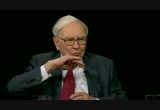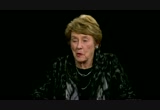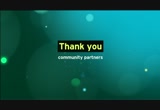tv Charlie Rose PBS November 27, 2012 12:00am-1:00am PST
12:00 am
to ask his opinion about every story that you've ever had on your mind. it's -- it's priceless. and it's been priceless in a way to go at this book and to put it all -- see it all put down again, to add my introductions and to see how good fortune was at staying with this man as i say we were standing by while warren buffett was becoming warren buffett. and it was a remarkable thing that we were allowed to do and i loved it. >> rose: buffett and loomis for the hour. next.
12:02 am
>> rose: warren buffett and carol loomis are here. one of the world's most successful investors and a long time friend of this program. she is the legendary "fortune" magazine writer who followed his career since he was a 35-year-old hedge fund manager from omaha. in 1966 she couldn't even get his name right. she spelled his name with only one "t." it was an unlikely start to a beautiful friendship and to "fortune"'s coverage of the man who we've come to know as a chairman of berkshire hathaway, tap dancing to work is carol loomis' new book, it's a collection of articles telling the remarkable story of warren buffett. it's also a story about friendship. i'm pleased to have them together at this table. welcome. >> thank you. >> rose: so good to have you together. >> terrific. >> i want to talk about the book and about the career and about "fortune" magazine and the relationship, but first this morning we all got up to read an op-ed by you called "a minimum tax for the wealthy."
12:03 am
and you start off bying a most investors you know, if it's a good deal they're not going to be upset about the fact that they're going to have to pay some tax. >> every investor i know. i've never -- i'm 82 years old and i'm looking like diogenes at that investor who says "i think i'll look at this chance to pass on this money." >> rose: even if it's a certain deal -- >> i'm going to call you tonight at midnight and say "this is the best idea i've ever had." and will you say "how much is the tax i have to pay?" >> rose: i don't think so. you say "in the meantime maybe we'll run into someone with a terrific investment idea who won't go forward with it with the tax he would owe when he succeeds. send it my way. let me unburden him." >> that offer goes to all viewers. >> rose: you have a serious purpose. what is the minimum tax that you think ought to be done today by congress and not wait for all the time it might take and all the deals it might take to reform the tax code. >> i think on incomes over one million that the excess over one
12:04 am
million should be -- have a minimum tax of 30%. as you know, they're talking about bringing the top tax rate up to 39.6% and right now the tax rate is 36%. >> rose: if you make from one million dollars to ten million dollars a minimum tax of $30%. >> on the million to ten million and over ten million 35%. and the reason i'm suggesting that is because the 400 highest taxpayers in the most recent year we have figures for, 2009, who had average incomes of $202 million, half of those people paid at a rate below 20%. a quarter paid at a rate below 15%. and believe it or not, six, average income of $202 million paid nothing. they were members of romney's 47%. i mean -- and i suspect he got their vote. but just a bunch of moochers. just a bunch of moochers. >> rose: they voted for him, did they? (laughs) >> but they're -- well, we've conducted a survey three times in my office in three different
12:05 am
years and the office has between 16 and probably 21 employees during that period and each time my tax rate was considerably lower-- i'm talking about payroll taxes plus income taxes-- considerably lower than anybody else in the office. these people made various incomes. and the tax law in many cases is not progressive. i think the tax law should be progressive. i think that when people make $15 or $20 million or $200 million and pay a 10% rate i think something should be done about that. >> rose: then people step forward and say well, that's because most of the income comes from dividends which is taxed at a lower rate. >> they would probably say most of it comes from capital gains and it taxed at a lower rate. >> rose: i mean capital gains. >> this just makes sure people who have really high incomes pay at the a rate that the people next door to them are. >> rose: if you had automatic powers to establish what the tax rate should be both for capital gains and ordinary income, what
12:06 am
would you set it at? >> well, i would probably have -- i would probably feel that capital gains should be at least at the 25% level and i would -- and dividends should be as ordinary income and i would have a more progressive tax system than we have. but since the lobbyists and the lawyers for the rich are so good at getting around these things i would have a minimum tax so no matter who your lobbyist or lawyer was, if you had $10 million or $20 million of income you paid at a rate comparable to what most of the people who are watching this program pay. >> rose: you write about and you know enormously successful businessmen and women. if you sat down on a one-and-one conversation, do you think they would agree with him or not? which are they? >> well, i don't think it would be unanimous by any means. well, the majority -- >> rose: does he represent a voice in the wilderness for very wealthy people in the ideas he has about what's necessary and fair to do? >> i think there are a lot of
12:07 am
people who agree with him. but i'm not sure that it would be over 50% by any means. >> rose: you think he's right? >> i do. i must say, my husband worked on wall street during a time when there was a lot of income associated with working on wall street and so i'm not talking as someone who wouldn't be subject to quite a lot of tax. and i é think problem is no ones ever talking about the payroll tax. that just doesn't ever come into the discussion. but when you add it in as warren has pointed out that you should do, it makes a huge difference and so i do think he's right. >> rose: you hope that the president will be responsive to this. you think it's what ought to happen today. >> i hope the president and the congress is responsive to it. i think that -- i don't think we should wait around to have a -- there are all kinds of things wrong with the tax code. reform is called for. expenditure cuts are called for. but i don't want to wait around until all of that stuff is done to do some things that are obvious now. so the people who talk reform,
12:08 am
some of them -- many of them really are seeking reform. but some of them are saying "reform" because it just means pushing things down the road another year or two. and i do not want to have something that obviously should be done be held hostage to getting everything done. >> rose: so therefore do the minimum tax now? >> i'd like to say starting january 1. >> rose: what happens if the fiscal cliff comes and happens? what will it do to our economy? >> i don't think it will do that much because i think people will assume that a solution will be found quite promptly. it's a little like the debt ceiling question. i mean, people know -- the rest of the world may think that we're idiotic at times but they don't think we're going to commit suicide. and so i think if -- i hope something gets worked out before january 1, but if it goes a little beyond that i do not think -- >> rose: so january 10 or -- >> if you guaranteed me that the fiscal cliff we would go past that, i wouldn't sell a share of
12:09 am
stock today. >> rose: you have that confidence that in the end they will fix it? >> yeah, and this that think economy works. >> rose: is it getting better? >> it's getting better. it's been getting better since really the summer of 2009. we've had four years straight now where the stock market's given a profit of return. the economy is getting better. we had a tremendous bubble and when it burst it was -- it had ramifications for all aspects of society and it was magnified by the abuses that had taken place in wall street and all kinds of places. so the dominos were lined up. we had plenty of problems. but we have been on the mend now for three years and it's taken a long time because it was a big problem but we are getting better all the time. >> rose: this book is called "tap dancing to work. " why did you choose that title? >> (laughs) >> rose: (laughs) >> i've learned a lot about the publishing world in the last few months and i've learned the title is a process of negotiation between the
12:10 am
publisher and you and i came up with this after we'd considered two or three others and the publisher just -- displayed great judgment. said "i think it's a wonderful title, let's go with it." and that'sed what because he is a man who tap dancing to work. has forever. >> rose: and has talked about it. you have talked about tap dancing. it is someone -- you explain what it means? >> it means i can hardly wait to get to work in the morning. it's the most exciting part of the day is getting there. and i -- there's never been a day i haven't looked forward to it. >> rose: do you like monday through friday better than saturday and sunday? >> it depends whether nebraska is playing football. >> rose: or if they're playing notre dame. >> well, i don't want us to play notre dame this year. >> rose: what makes you think he doesn't go to the office on saturday and sunday? >> i go to the office on saturday. >> rose: but what you do at the office and at home is the same thing. reading and on the phone. >> i'm reading and thinking and on the phone and talking to
12:11 am
friends. there's very little difference in saturday and sunday from the weekdays. a little more action during the week, though. (laughs) >> rose: this reminds me of what surprised you most about him in terms of advice. you asked him what was the worst advice? >> well, we were doing a big action. he was going to be on the cover and so i -- without truly knowing the answer to the question i said all right, now, tell me what is the best advice you've ever gotten in your life from anyone? and he proceeded to talk for a long time about the worst advice that he had ever gotten. so i went back and told my managing editor this, which probably kind of -- with my head down in thinking well i hadn't come back with quite the right thing and we put him on the cover anyway. >> rose: well, what's interesting is the way you answered the question which is smart people told you don't go into the securities business. what did you read from that? because you went into the securities business. >> not only smart people, but
12:12 am
people that love me and that i love them. so they were giving me their best advice. >> rose: because they thought you weren't ready for it or because it was a bad business. >> they thought stocks were selling too high because the dow jones was above 200 and i always feel on almost anything that if you're going to do it, get started. and the idea of sitting around and waiting for a different time did not register with me. now, it's also possible that i was 20 years old then and that i was behaving like i was about 14 and looked like i was about 16 or something. so that may have been their nice way of telling me "grow up a little bit before you do it." but beyond that, though, they did feel -- here are the two guys i admired the most in the world and they told me the stock market was too high. my father and ben graham and i said "listen, i want to get going." i don't want to go to college. >> rose: you'd already been going because you'd been investing since you were 11 years old. >> that's true but now i'm doing it full time. (laughter) >> rose: the first time you met this guy you were doing a piece. before you met him you were
12:13 am
doing a piece on a hedge fund guy named -- >> alfred wins low jones. very famous. >> rose: very famous guy and the name buffett came up. >> sam stamen, a bridge player, was an investor in this strange thing called buffett partnership limited. >> rose: yeah? >> and i just blithely went ahead and spelled it with only one "t". so the first time he was ever in "fortune" we misspelled his name. i say "that's the editorial "we" because it was i who did it. >> and it's the only mistake she ever made. she's never been wrong. >> (laughs) >> rose: your husband, john loomis, met him first. >> yes, he did. >> rose: and said what? >> he said "i think i've just met the smartest investor in the country." and i'm sure like wifes do i rolled my eyes and thought, oh, yeah, yeah. then i met him with his first wife susie and i realized how terribly impressive he was and
12:14 am
from that day forward i thought that, too. >> rose: and then he formed berkshire hathaway. >> well, he'd taken over berkshire hathaway but it was -- nobody knew the name. it was totally insignificant. and so then we worked up from that one sentence with the word misspelled to two paragraphs in 1970. but by 1977 we had a 7,000 word piece by warren himself. we recognized that he was a very good writer and we went forward with that, too. and so this book has a dozen pieces by him and the one i just mentioned was only one. >> rose: what was that piece? the first piece. >> that was how inflation swindle it is equity investor. >> rose: people still talk about that piece. >> (laughs) i'm not sure what they say about it. >> rose: i read that. >> they write him about it. they write us about it. it's a famous piece. it really is. >> rose: if you were writing today the same kind of piece-- and perhaps you are-- other than
12:15 am
the letter to stockholders, what would you be saying about where we are? >> i would do a lot of historical things and all of that but basically i would say that for most -- overwhelmingly for people that can invest over time that equitys are the best place to put their money. >> rose: i should also talk about the letter to the stockholders. you came in to do -- you knew her, you admired her, you thought she was the best business writer she ever met and still do. >> yup. >> rose: tell me about the letter to stockholders and what you want to do with that and who you're addressing in your own mind's eye? >> i'm addressing partners that are 600,000 of them. but in my mind i usually have my sister two sisters bertie and doris. and they're very bright. they don't work in the financial world. they've been gone for a year, metaphorically, and they've got a lot of their money in berkshire hathaway and i want to tell them what i think is
12:16 am
important to them. what i would want them to tell me if our positions were reversed. so i try to do that. then i occasionally branch into an essay on something that i think may be important in the investment world generally. >> rose: or even the country. >> yeah. >> rose: and you got involved in the beginning -- i >> i got involved in 197 and -- >> rose: you want to take a look at this? >> warren sent it to me and said "i'm trying something new with the annual report, would you look it over and tell me what you think?" and i was very timid in what i came back with. i think i suggested changing a "the" to an "a" and that seemed to work all right and so the next year he sent it again and then it became a routine where he would write it in long hand, his assistant would type it and it would come to me and then we would have drafts flying back and forth with suggestions from me. >> rose: well, i think there's a story in here, too, that the first thing you wrote the editors wanted to change some things.
12:17 am
was it the first thing? and basically they almost killed the article because you didn't want that much editing? >> well, and -- i think that was the 1977 article. megagreenfield, who was a famous writer for "newsweek" and -- >> rose: right, yes. >> i showed her the article i'd written and meg very gently said to me "warren, you don't have to tell everything you know in one article." (laughter) >> rose: isn't there a story that one of the editors at "fortune" -- >> the one who was assigned to the piece and went out to omaha to get him to change certain things called up and said "i'm not having too much luck getting him to change anything. maybe we should think about not running this." and the managing editor said "no i think it's worthwhile." and so we did. 7,000 words without many pictures. really not any pictures. >> rose: so what does she do
12:18 am
now? just dotting "is" and crossing -- (laughter) >> well, for one thing i rewrite it about ten times before i send it to her. and then i send it to her and -- she never tries to change content or anything but she points out when the flow is wrong, where there's lots of grammatical errors, all kinds of things and sometimes she'll write "this is my least favorite part of the report." (laughter) and usually it is, too. >> rose: how many years has it been, this friendship? >> well, what is that? 35? 35 years. oh, the friendship has been longer than that. the friendship goes back to 1967. >> she has a charm bracelet -- four charm bracelets, a replica of every report. >> rose: what's the secret to the friendship? >> well, certainly on my part all kinds of things. she's a wonderful friend but she's also one of the smartest
12:19 am
people i've ever seen and she's objective and in a very, very nice way she tells me when i'm full of baloney. (laughter) >> rose: is that how you see it? >> well, i do think i'm one of the few people who argue with him. i do think that. and i do sometimes about -- >> rose: you don't have people argue with you? >> um -- >> rose: (laughs) >> charlie -- my partner charlie we've never had an argument, we had a lot of disagreements and wherever we have a disagreement his clincher always is "warren, when we get through talking about this you'll agree with me because you're smart and i'm right." (laughter) and i'm one of the few people who do argue with him. i think it's only a handful. >> rose: will argue with him. here is what interests me. why is he -- does she the record he does? and you have said in a conversation with me he understands how to look at accounting statements and find the telling point.
12:20 am
and it may be in a footnote. >> that's true. >> rose: so that he'll see opportunity and see the future. >> he will. he has an ability to do that that i think is matched by very few other investors. and he has this broad, extensive knowledge of business. and i think maybe i said this to you. so when something new comes up, he has a frame of reference in which to place it. and then he adds this rationalety that i really think just a handful -- >> rose: what do you mean, rationalety? >> well, he doesn't let emotion take over when he's considering whether to buy. he goes at the decision in a very rational way and then the price goes down and hi buys more. whereas most people panic and sell when the price goes down. and he just is -- he's extremely disciplined in the way he thinks about investments. >> rose: this will take a long
12:21 am
time to explain, but how is it that you know value so well? so that if it goes down you know the value hasn't changed so you buy more. and so that you know the value -- so you're not going to pay a nickel more than the value you see. >> rose: i don't want to get into the situations where i do know the value. there's thousands of companies whose value i don't know. but i know the ones that i know and incidentally, it is -- you don't pinpoint things. somebody walks in this door now and they weigh between 300 and 350 pounds, i don't need to say they weigh 327 to say that they're fat. (laughter) if they're in that zone i'm fine with it. but i'm also -- i know there are all kinds of companies i can't figure out. so i don't -- i do know -- i usually know when i'm dealing with companies that i understand and then i do accountings of language, and it's a language that i like. >> rose: a language you not only
12:22 am
understand but like. >> i like it. >> rose: because it speaks to you. >> it really speaks to me and when it speaks in a false voice i can detect that sometimes, too. so, you know, i mean it's -- it is almost like playing music, you know when you look at an accounting statement. and that's not true of all companies, not true of all companies at all. but you don't have to be right about -- i don't have to be right about the ones i ignore. >> rose: when you see a footnote that says something to you, you just kind of feel an emotional -- >> it's in the footnotes. you're right. the footnotes are -- >> rose: good or bad, there's a story. >> there's a tipoff there. and carol is very, very good at this, incidentally, herself. >> well, so far down the latter on this compared to where he is. >> rose: let's look at the investments that berkshire hathaway -- you still have a lot of coca-cola. >> a lot. (laughter) >> rose: you saw the value of that early on. >> well, not early enough. i mean, i probably had my first soft drink in 1935 and i didn't
12:23 am
buy the stock until 1988. (laughter) so i would put me in the slow category on that one. (laughter) >> rose: you still have a lot of wells fargo and buying more. >> a lot of wells fargo. >> rose: value there. and the qualitys you look for, management is one. >> sure. some kind of an enduring competitive advantage. enduring being the emphasis. i mean hula hoops were great for a while or bedrocks. but i like something where i think i can look out five or ten years and still see the same sort of advantage that -- maintaining. >> rose: so you just invested in john deere. >> that wasn't me. nope. we have two other -- >> rose: okay. okay. >>. >> rose: but you know what they're doing, do you not. >> no. i don't want to know what they're doing. >> rose: they're hired to -- >> they manage something around $4 million. >> rose: you don't want to know what they're doing? >> no. they have the responsibility for managing that money.
12:24 am
they've got to have full authority. they can't look at me and see whether i'm smiling or frowning and they get paid based on how those securities do. >> rose: you have said you're hunting for a big elephant. >> you bet. the bigger the better. >> rose: what qualifies as a big elephant? >> well, in terms of our resources probably something from $20 billion maybe up a little bit. >> rose: how high? >> well, it would depend on how attractive that elephant was. (laughter) not all elephants look alike. (laughter) >> rose: coming to you, carol, in just a moment. so you're looking around. how will you go about this process of looking for a big elephant? because you've said the trigger is -- you've got your hand on the trigger. >> absolutely. >> rose: you're ready to fire. >> you bet. >> rose: you've got the money. you've got $45 billion or whatever it is. >> enough. >> rose: enough. you've got it sitting right there. you're prepared to do it. how do you find the candidate? >> if you're talking about
12:25 am
buying an entire business, which we're talking about in this case i'm familiar with all the companies when you get to that size. i've seen all the elephants. so it's really a question of when they -- somebody at the company, the c.e.o., the board is actually thinking about doing something. and then i can tell very quickly -- >> rose: you know whether they are open to -- >> yeah, whether -- the initiative has to come from them because, you know, coca-cola isn't for sale, wells fargo isn't for sale. >> rose: i.b.m.'s not for sale. >> sure. so i know the universe of companies of this size we're talking about and if i pick up the phone one day and somebody says, you know, we've really been thinking about things and we feel that we'd do better as a part of berkshire, i'm ready to -- >> rose: this is what's amazing, carol. a lot of companies that come to berkshire hathaway, they wanted
12:26 am
to be there. >> that's right. they that's absolutely right. >> rose: think about the israeli company. somebody says mr. buffett, can i come to omaha and talk to you. >> right. >> rose: and you're pretty quick on the draw to figure out whether or not you want to go forward. >> five or ten seconds, yes. (laughter) >> rose: talk about that. because merge herbs is -- >> he does make up his mind in literally minutes if not seconds as to whether this is something he wants to consider further. and he will within that much time say to the guy on the other end of the phone, "well, i'm interested." or, "well, i don't think this is for us." and he knows. he's seen this great universe of companies and this is what i'm talking about. he brings this frame of reference to it and knows that this company has nothing of kind of eternal nature to offer. like coca-cola has something eternal to offer. >> rose: you also get in this
12:27 am
book about biggest mistakes, right? >> i do. >> rose: what's the biggest mistake this guy has made? >> well, warren himself would say that there are acts of omission where he has known that he should buy a stock and hasn't bought it. one that he cited there is fannie mae. this is before fannie mae got into trouble. but he would have gotten out, i think. but he did get out of freddie mac, which was a case where he bought a lot and did get out at the right time. and so the biggest mistakes, well, a couple of times he's been hurt by people who erred in the way that they acted. there's no question about that. the person i'm thinking about had done a remarkable amount -- david sokol-- had done a remarkable amount of berkshire hathaway and so i don't think it was something that warren could have known that presented with a certain set of facts that david
12:28 am
sokol acted in a way that didn't work. >> i bet you asked yourself that question, didn't you. >> rose: yeah. >> how could i have not seen -- >> i don't know the answer. and he did a lot of good thing for berkshire. >> rose: of course. but you've said the hardest thing to do-- and it doesn't happen that often-- is to fire somebody. >> yeah. it's absolutely miserable. and, you know, i don't have to do it very often. but i'd pay a lot of money to have a designated firer. but the trouble is i can't do it because these are people that are friends of mine. >> rose: one of these cover stories-- and you have to remind me which one it was-- signal, i think it was the one you wrote, the big profile, of the transition from investor to c.e.o. and manager. showing that warren buffett had those skills as well. >> right. well, there are several articles in the book that really pertain to that. but i think the one that you have in mind is "the inside
12:29 am
story of warren buffett." >> rose: that was the first big profile. >> and it was the first big article i'd ever written about warren. it was 1988 and he was making a transition then. at the time he had six companies that he called the sainted six -- six or seven in. >> i think it was seven. >> that's right, sainted seven. named like fetchheimer. but he was clearly headed in that direction and charlie was helping him because charlie was pointing out the virtues of things like c's candy and they were really at that moment transitioning to a company this had been distinguished by its investments to a company distinguished by the companies that it owned entirely. and even today i think that berkshire hathaway is underestimated. warren is not underestimated. but berkshire hathaway and its
12:30 am
power and might i do think is a little bit underestimated. >> rose: but you have a reputation for delegation. >> yeah. abdication, actually. (laughter) i'd like other people to do the work, charlie. >> rose: but you're not out on a boat somewhere. you don't delegate because you want to do something else. what you want to do is the same thing you've been doing everyday for a long time. >> you bet, yeah. i like knowing what's going on but i don't want to direct the orchestra, i want to listen to it. >> rose: i once asked what was the allocation of capital, he said "well, send the money to omaha." that's what allocating of capital is. >> rose: and the c.e.o.s of the subsidiary say they don't have to worry about it. they just ship it off to ohm ma, that's it. >> rose: we'll make it, you spend it. is that what berkshire hathaway great? >> it gives us something to work with. >> rose: all right, these are pearls of wisdom.
12:31 am
rules of investment. number one: never lose money. number two: never forget rule number one. (laughter) and career advice this is important. i always tell college students to take the job you would take if you were independently wealthy. you're going to do well at it. you and i, true. >> that's absolutely true. you know that in most companies merit is recognized and so what you need to do is to get into a company and show how good you are and you will get pushed up. >> rose: that's exactly what i say. >> i moved to new york when i was 23. we had a child, we another one on the way and i took a job with ben graham, who was my hero. and i do not know my paycheck until i got -- my pay until i got my first paycheck. i never asked what the salary was. i just knew i would love the job. >> rose: he and your dad still remain the people that had the most influence on you in terms of -- >> well, they were huge but i've
12:32 am
had others, too. joe rosenfield, tom murphy. certainly my wives. carol's had a lot of influence on me. >> rose: she played bridge with you. >> (laughs) >> rose: you call her up everyday. >> just about everyday. >> rose:or she calls you? >> no i call her. >> rose: what's the conversation about? did you see this? >> just depends what's going on. >> rose: "did you read this story"? that kind of thing? >> there's plenty to talk about. >> big business events. sfp >> your show last night. >> rose: which you saw the next morning. if the internet won't change chewing gum, i try to figure out how an industry or company can be hurt or changed by it and then i avoid it. take wrigleys, i don't think the internet is going to change the way people chew gum.
12:33 am
>> well, you know, the innovations are enormously important for society. but they disrupt a lot of things and, you know, i used in one of the articles in the book the auto industry. there's a couple thousand auto companies and a few succeeded-- barely. so auto was enormously important. i love the fact that it was invested. the airplane was important. but if you take all of what's happened in the airline industry since orville was down there in it theky hawk, some capitalist should have shot him down because he cost us money. >> rose: what's the -- what's wrong with the airline industry? >> well, it's a commodity product. the incremental seat cost is nothing. so they have the temptation to fill the last seat at any price and if you get four or five guys trying to fill the last seat at any price you don't get good prices. it's structurally set up so that it's very, very difficult to have a sustained competitive advantage. and you get this enormous fixed
12:34 am
investment in planes. now you've got the plane. it costs you a couple hundred million and you're trying to fill a seat and you read in the newspaper today that your competitor is charging and you have to charge the same price. it's got terrible structural aspects to it. and i bought into it. (laughs) >> rose: you also bought into the railroad industry. >> yeah. >> rose: freight carrying railroad industry. >> yeah. >> rose: burlington -- >> b.n.s.f. burlington northern santa fe. >> rose: why did you do that? >> well, the railroad industry carries 42% of all tonage intercity. it care reeds it -- carrying a ton of cargo 500 miles on as gallon of diesel. it's an enormously efficient way of moving things. and now you have four huge railroads in the united states. they're not going to build any more of them and it will be the backbone of the movement of goods 50 years from now or 100
12:35 am
years from now. >> rose: what's the this history with derivatives? >> well, he has a checkered his we with derivatives. first of all, one of the best stories in the book is from 1987 right after the crash of '87 and it's a letter he wrote congressman dingle in which he -- >> rose: john dingle. >> absolutely. in which he warned about what could happen with index -- trading futures -- index trading futures trading of index which was just then being about to be approved by congress and was approved by it and warren warned about that and if he had been listened to i think we would be far better off today and he has always -- so that's an early thing about derivatives. >> i think i wrote the letter in '82. >> well, you wrote in the' 2 but
12:36 am
we printed it in '87 after the crash. >> rose: you wrote it and it wasn't printed until '87? >> "fortune" printed it and ran it. then on derivatives, what i say about warren is that he really cannot ignore securities that have -- are mispriced. i think that he has -- >> you noticed that, huh? (laughter) >> you know, he doesn't go out and buy raw cotton or anything like that, or not very often. but derivatives in his eyes have often been mispriced so on the one hand he will be writing in the annual report warning about derivatives and on the other hand he'll be buying those that are clearly mispriced. >> rose: mr. buffett, i plead you. >> i know every single derivative we own and they're all the product of my purchase. now, we've bought a company called general rhee which had $23,000 and it cost us $400 million before we got out of those. we tried to liquidate every single one. but the 200 some that i picked i
12:37 am
think we'll make money on. but i'm a familiar with every one of those. i think when you have an -- well lehman had probably a million and you get huge counterparty risks. general rhee when we went in -- we had over 900 counterparties. i didn't know who 300 or 400 of them were. i couldn't pronounce their names. that's not my idea of prudent finance. >> rose: doesn't dodd-frank speak to derivatives? >> it does, to some extent. but i'm like warren, i haven't read the whole thing and i have not written about in the which case i really would have an opinion. but i could not express a strong -- the volcker rule appeals to me. >> rose: does it appeal to you? >> it appeals to me. >> rose: it's the right thing? >> in general. i think the more banks stick with just pure banking the better i like it. they have a franchise from the united states government in that people look at their deposits and as guaranteed by the u.s. government. that's not totally correct but that's what they -- and when you have the ability to take in
12:38 am
money from people who feel that they have the u.s. government behind it, they're going to give you money whether you're credit worthy or not and therefore you need some real regulation to make sure that people don't go wild with that franchise and banks with those funds and with that trust can some do some pretty extreme things. particularly when they've got -- the upside belongs to management. i don't worry about moral hazard with stockholders. they get killed in all these banks but management made lots of money and they didn't go away broke. >> rose: how do you assess -- i mean, this is part of that, i think-- what happened in 2008 and the subprime? >> well, it wasn't just subprime but it -- we left -- >> rose: that was part of it. >> we had a housing bubble like the world has never seen. well, housing was $22 trillion at the peak out of maybe total assets in the united states of $60 trillion or something. so it was an enormous asset.
12:39 am
50 million people, families, had borrowed against that and they borrowed $11 or $12 trillion. so you had an asset that had a huge bubble that was owned on margin, basically. and people thought it could do nothing but go up like in the '20s they thought stocks could do nothing but go up. so when that bubble burst, not only in housing, it just started rippling through the economy. and we found out that almost every company in the united states was a big domino and they were lined up very close to each other and they started toppling. >> rose: do you believe the executive there is knew what they were doing? >> well, they did not see the consequences of the dominos starting to topple. people -- when the dominos topple, eventually they get to everybody and people did not realize how big they were, how close to each other they were and people looked at freddie and fanny which were the first ones to get in trouble in september, more or less, then wamu then lehman and then merrill lynch
12:40 am
and suddenly people realized they had bank lines that wasn't going to happen so it was as close -- to the wildest panic i ever saw. >> rose: the wildest you ever saw? >> by far. >> rose: you got out of the hedge fund business in -- >> end of 1969. >> rose: because? >> i got out because i didn't -- i had a good record up to then. i had all these people counting on me and i thought things were getting speculative and i didn't know how to make money in that period and i was competitive enough to feel that i don't want to do lousy compared to other people yet i didn't want to do the other things they were doing so the only thing i wanted to do was give the money back and i gave the money back. >> rose: what do you think of hedge funds today? >> well, i think that -- i made a famous bet that carol has been keeping track of where i'm betting that hedge -- a large group of hedge funds, funds of funds will underperform the s&p over time.
12:41 am
>> rose: what's the bet? >> well, we've got a million-dollar bet for charity out in -- something called long bets. but calling yourself a hedge fund is that -- it gives you no special way to make money and the fees associated with it are very, very high. and i'm -- i do not think the results of hedge funds in aggregate will be better than the s&p which you can buy for -- >> rose: in the couple years that you didn't do as well as the s&p. >> well, there's been a number of years. yeah. >> rose: how does that make you feel? >> makes me feel like i better do better next year. (laughs) that's my job. >> have you noticed he's competitive? (laughter) >> i wouldn't be in this business if i wasn't. >> rose: there's also the question which is always asked of you, succession. you have said the board of directors knows who my successor is as of this moment. >> they know tomorrow.
12:42 am
if i die tonight tomorrow morning they will appoint somebody they know. >> rose: and the person they appoint doesn't know he is the one to be appointed. >> that's correct. >> rose: and will the role be the same role that you have? >> no, it will be half my role. it will be running the businesses and there will be -- they will run investments. my job will be split. >> rose: but running the business is as important to you as the investment aspect of it? >> well, running the businesses will be more important over time sure. it is right now. >> rose: does it have the same -- >> running a business has more psychic satisfaction. >> rose: the friendship with bill gates, you and i have talked about this many time, with you and with bill. but for this audience at this moment, from the moment that you two had dinner together at bill's mother's house and bill's father started asking questions about what was the quality that was most admired and i think
12:43 am
bill said focus. >> we both answered focus. yeah. >> rose: and then you make a decision that when it came time after susie's death that you wanted to do what she would have done to make -- do philanthropic you chose bill because you thought the gates foundation did it right? >> i chose five but the gates was the largest one. >> rose: but the friendship itself is born out of with what? >> well, i'm -- it's like with charlie you find the other person very interesting. you find them trustworthy. you have a good time with them and -- but it's important to point out that there are five foundations. i just doubled what i give to each one of my children's foundation. so they have over two billion each there but they couldn't scale up the same way as bill. >> rose: and the mount for bill's foundation --
12:44 am
>> yeah, it would be -- it would be still about the same. it's 5% of a declining balance so if a stock goes up more than 5% a year the amount keeps increasing. >> rose: what is it -- knowing this man as long as you have, shared as many conversations as you have, what are you curious about with respect to him? >> well, i don't see how he has as much energy as he constantly has. (laughs) i think he draws energy from being out like talking to you. he's amazing about that. i worry about my getting tired while he's just out there just running around all the time. what am i curious about? well, i wonder what he thinks in his innermost thoughts sometimes about some of his maybe not perfect investments. but i'm not curious about a lot because i know an awful lot. >> she knows every chapter of the book. (laughter) she knows it all.
12:45 am
(laughter) >> rose: i know a lot of it. >> i know you do. >> rose: doing the book, as a matter of fact, refreshed everything that i knew. >> rose: there was this item, too. berkshire hathaway has overcome general electric. it's now the sixth largest company in terms of market value >> i haven't looked -- that doesn't surprise me in this area. >> rose: does that mean anything to you? >> well, it means -- >> rose: i bet it does! i bet it does! >> what means something is having it outperform the general market over time. i mean that -- my job is to do better for my investors than they would do if they were doing it themselves. and since we retain all the earnings, we've gotten very large, but we'll get a lot larger. is. >> rose: when you first met him, i think berkshire hathaway was $22 a share, something like that? >> that's right. >> rose: it's now $133?
12:46 am
>> i don't know where it is but that's the same stock, $22 to $133. it's remarkable. >> rose: let me come back to the nation's health and the global economy. europe? >> europe is still drifting downward to some degree. we have businesses that operate worldwide and actually asia's coming off the best rate of growth. but they're coming -- they're coming down somewhat. >> rose: no longer in double digits? >> europe has been sliding for some time and the u.s. actually is i would say strongest relative to where it was six months ago or nine months ago. the housing is coming back big time. >> rose: and the emerging nations? even brazil, they're all higher. >> yeah. but five years from now, ten years from now, the world every will be doing better, in my view. >> rose: because? >> just because capitalism and market systems work.
12:47 am
it's been working since 1776 here and it wasn't because we had stimulus programs in 1794. it's because, you know, a system -- our system unleashes people's potential and we've got 312 million people that want to do better tomorrow than today and over time that works. human potential is still untapped to a big degree and our system does unleash it over time and we do it in fit and starts but this country goes forward and it will continue to go forward. the luckiest person in history on a probability basis, in my view, is the baby being born in the united states today. >> rose: more so than china? more so than places for where the basis s lower and they'll have a greater opportunity to -- >> yeah. >> rose: what's created the most number of billionaires in the last three years? >> i don't know about the last three years but finance created a lot of them and i would say that relative to their contribution to society, a
12:48 am
disproportionate number -- >> rose: well, that's a point that's made. some people argue that the financial sector is too large a percentage of our economy. >> when you get a huge capitalistic system, just the crumbs that fall off the table can make people very rich. particularly if they're very good at getting other people to hand them their money and if they get favored tax treatment and a bunch of things. i said a long time ago that if you want to get rich per point of i.q. and per everything of energy, just hold your nose and go to wall street. that doesn't mean they're charitable people or anything like that, it just means the payoff is so much greater relative to what you bring to the party than it is in most aspects of society. take journalism. >> rose: buy newspapers, community newspapers? >> yeah. >> rose: that because you had an opportunity to buy from that particular company, a number of them? or you believe in something like rupert murdoch, it's in your blood. >> it's in my blood but i won't pay a price that reflects the
12:49 am
fact that's in my blood. (laughter) >> rose: have you ever paid -- i mean, i believe you could argue that rupert, for example, would buy something because he had to have it and pay more. >> that's right. >> rose: believing that he could make some kind of efficiencies and he'd still have it. have you ever done that? >> no, i wouldn't do in the berkshire hathaway. >> rose: that's what you owe to your stockholders? >> yeah, it's their money. we don't taken a editorial -- i don't dictate an editorial position -- i voted for obama. we have 12 newspapers that endorsed -- ten of them endorsed romney and i'm the c.e.o. but two papers endorsed obama which who i voted for and ten endorsed romney. >> rose: speaking of obama, the president, do you think he'll be different in the second term? >> somewhat. he won't -- >> rose: what makes you think that and how? >> i think second terms are different than the first terms. >> rose: first terms can be full of land mines, too. >> they can be. but in the first tomorrow some
12:50 am
extent you and your party have to be thinking about your reelection. and a second term certainly frees up that aspect of it and then the question is how effective you can be in getting congress to work with you. >> rose: you have access to him. he calls you and -- >> i've never called him. (laughter) i've never called the president. >> rose: but you talk to him on the phone and go meet him. do you think he has a new attitude about business that's come about because of the first four years? >> i think that in the first term he felt that business misunderstood hoopl and i think that business felt that he misunderstood -- they were misunderstood. i think they -- >> rose: do you think he believes and understands that business is the place where jobs are created? >> oh, there's no question about it. he knows he's dependent on capitalism working and that business is part of that. i think to some extent when people do feel misunderstood by the other party it can develop
12:51 am
its own dynamic. >> rose: that's what happened here. >> but i think both sides should just say "forget it." wipe the slate clean and it's sometimes a good idea in human relationships, and a particularly good idea when the country's well-being is at stake. so i would recommend both sides just say maybe i was misunderstood by you but forget it we work together going forward. >> rose: do you think he wants to do that? >> i think he wants to succeed big time. and i think he will and i think the economy will be a help. but neither side can roll over in term t things they feel strongly about but i feel that the rhetoric should be very civil all the time and i think that you look for ways to work with each other. >> does this send a big signal to the country if he would appoint as secretary of the treasury someone like jamie dimon? or jamie dimon? >> well, i think that might be a
12:52 am
big signal. >> rose: appointing jamie dimon as secretary of the treasury? >> i think he'd be terrific because i think he -- if we did run into problems in markets i think he would be the best person you could have. >> rose: he knows that much about markets -- >> and i think world leaders would have confidence. >> rose: so when you see a problem that jamie's had with london and all that, what do you mark that up to? >> if you run a $2 trillion institution -- if i run berkshire for decades, some things are going to wrong go wrong. if you run an army, if you run a church, if you run a government, any large institution people go off the reservation sometimes and sometimes they'll get away with it and when you work in a financial institution you can add a lot of zeros. so, you know, obviously there was a failure of control but there had been failures of control at berkshire. i am going to make mistakes.
12:53 am
i hope i minimize and catch them fast but there could be big mistakes. >> rose: should bowles-simpson be the operating model from the menu they operate on and do you believe that's the direction to go? >> i think the menu should be something that raises 18.5% of g.d.p. and revenues and embodies -- with no loopholes, basically, the idea of a progressive tax system and i think expenditures should be reduced to the 21% of the g.d.p. level and that will be sustainable, those ratios. >> rose: you want to eliminate the deficit or the debt? >> it eliminates -- it does not eliminate the annual deficit. it keeps the debt as a percentage of g.d.p. constant. >> rose: and that's what we can live with in essence. >> we can live with it. the net debt is around 73% or something like that. that was 120% coming out of world war ii. and it will stay in the 70s,
12:54 am
might even come down into the 60s, the 18.5% and 21% won't increase the ratio of debt-to-g.d.p. and it may very well bring it down slightly. >> rose: what has this meant to you? this friendship with warren buffett? >> it's been a wonderful friendship. can you imagine the chance to warren buffett about almost anything? to ask his opinion about every story you've ever had on your mind? it's -- it's priceless. and it's been price tlos go at this book and to see it all put down again, to add my introductions and to see how good fortune was at staying with this man as as -- as i say, we were standing by while warren buffett was becoming warren buffett and it was a remarkable thing that we were allowed to do and i loved it. >> rose: i'm smart enough to give her the last word.
12:55 am
(laughter) >> rose: >> you are smart. >> rose: this book is called "tap dancing to work: warren buffett on practically everything. from 1966 to 2012." collected and expanded by carol j. loomis. thank you. >> thank you, charlie. >> thank you, charlie. >> rose: thank you for joining us. see you next time. captioning sponsored by rose communications captioned by media access group at wgbh access.wgbh.org
12:59 am
117 Views
IN COLLECTIONS
KQED (PBS) Television Archive
Television Archive  Television Archive News Search Service
Television Archive News Search Service  The Chin Grimes TV News Archive
The Chin Grimes TV News Archive 
Uploaded by TV Archive on

 Live Music Archive
Live Music Archive Librivox Free Audio
Librivox Free Audio Metropolitan Museum
Metropolitan Museum Cleveland Museum of Art
Cleveland Museum of Art Internet Arcade
Internet Arcade Console Living Room
Console Living Room Books to Borrow
Books to Borrow Open Library
Open Library TV News
TV News Understanding 9/11
Understanding 9/11